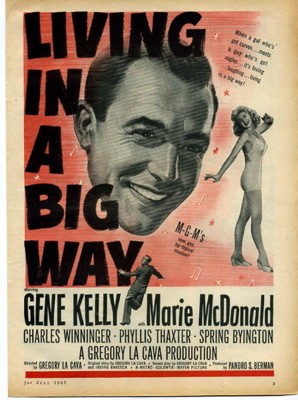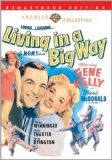| Reviews & Columns |
|
Reviews DVD TV on DVD Blu-ray 4K UHD International DVDs In Theaters Reviews by Studio Video Games Features Collector Series DVDs Easter Egg Database Interviews DVD Talk Radio Feature Articles Columns Anime Talk DVD Savant Horror DVDs The M.O.D. Squad Art House HD Talk Silent DVD
|
DVD Talk Forum |
|
|
| Resources |
|
DVD Price Search Customer Service #'s RCE Info Links |
|
Columns
|
|
|
Living in a Big Way
Probably its relative obscurity is due the fact that it's in black and white rather than the three-strip Technicolor one normally associates with Kelly's MGM musicals (this was the second of just two he made that wasn't), and perhaps partly because Living in a Big Way was not the product of producer Arthur Freed's team, famous for their '40s-'50s output. Rather, the film came via Pandro S. Berman's unit, though it's listed as a Gregory LaCava production. LaCava (My Man Godfrey, Stage Door) also directed and co-wrote the script. Either way, the film was a surprising flop when it was new, and LaCava's last credited work.
Though released to VHS in 1998, this marks Living in a Big Way's DVD debut. The full-frame transfer is excellent, though I experienced playback problems replicated on several players. The image skipped about a dozen times, not enough to ruin the film, but it was an annoyance. (I've experienced a similar, even worse problem on another recent Warner Archive acquisition, The Prize. I hope it's not a trend.) A trailer is included as an extra feature.
During World War II, Army flier Leo Gogarty (Kelly) and Margaud "Maggie" Morgan (Marie "The Body" McDonald) have a whirlwind courtship, meeting and marrying one another after only nine days. He goes AWOL but MPs arrest him before their wedding night. "You mean? You mean?!" asks Schultz (William "Bill" Phillips), Leo's pal.
Three years later the war is over and Leo is a civilian again, uncertain about reuniting with the wife he barely knows. And in more ways than one: during the interim, her door knob-manufacturer father (Charles Winninger) became extremely wealthy, presumably by converting his factory for the war effort, and Maggie is now very spoiled and selfish. Nor has she told anyone that's she's actually married.
This aspect of the film quickly becomes very conventional and predictable, with the veteran cast falling into established roles: Winninger as the long-suffering, nouveau riche but sensible patriarch; Spring Byington as the flighty but loveable matriarch; Jean Adair as the crotchety grandmother, Abigail, who sizes up and sides with Leo; Clinton Sundberg as Smythe, the acerbic butler who gives everyone a hard time, etc.
Through Abigail's help, Leo secures the original, now abandoned Morgan house that he and his Army buddies transform into a G.I. housing project. (After the war there was a severe housing shortage.) The men and their wives, including familiar faces like Jimmy Dodd, Barbara Billingsley, and Ellen Corby, all work together, poor but happy. Leo himself becomes attracted to a war widow, Peggy Randall (Phyllis Thaxter) and her son, Michael (Invaders from Mars' Jimmy Hunt).
Damaging the film is the trite and unappealing romance between Kelly and McDonald's characters. Returning home, she treats him shabbily while he refuses to let her off easily. Instead of agreeing to a quick, painless divorce he insists upon hanging around to taunt her, while she makes no bones about how wealth has made her selfish. She's too used to being pampered to give it up.
The studio thought the troubled McDonald (whose unhappy life ended in a drug overdose in 1965) might be another Lana Turner, but she's only marginally appealing here (though her unappetizing character is part of the problem) and her acting ability at this point is limited. The picture's script is determined to bring them together, even though the audience would rather see pretty Peggy and Leo tie the knot instead.
The film has three notable musical numbers. After a pleasant but somewhat conventional pairing of Kelly and McDonald for "It Had to Be You," Kelly's next dance partner is Maggie's dog, for "Fido and Me." Later in the same number Kelly dances with a large sculpture of a female form, about 10 feet tall. It's an innovative sequence topped by the brief but dangerous-looking number he does on the rafters of that construction site (obviously built on a large soundstage).
Also in the cast look for Margia Dean, Shelley Winters, Maxine Gates, Olin Howland (also in The Sky's the Limit), Robert Dudley, Charles Lane, Marie Windsor, and Dick Wessel, most in small, uncredited parts.
Video & Audio
Living in a Big Way looks nice, with rich blacks, good contrast and a sharp image. That said my copy had play problems likely due to a replication issue, skipping throughout on and off, never for more than a few seconds, but enough to take me out of the movie multiple times. It did play all the way through to the end, however. The region-free disc's Dolby Digital mono audio (English only), with no alternate language or subtitle options, is adequate. The lone Extra Feature is an original trailer.
Parting Thoughts
Highly watchable because of Gene and its large cast of character players, and its several outstanding musical sequences, Living in a Big Way comes Recommended.
Stuart Galbraith IV is a Kyoto-based film historian whose work includes film history books, DVD and Blu-ray audio commentaries and special features. Visit Stuart's Cine Blogarama here.
|
| Popular Reviews |
| Sponsored Links |
|
|
| Sponsored Links |
|
|
| Release List | Reviews | Shop | Newsletter | Forum | DVD Giveaways | Blu-Ray | Advertise |
|
Copyright 2024 DVDTalk.com All Rights Reserved. Legal Info, Privacy Policy, Terms of Use,
Manage Preferences,
Your Privacy Choices | |||||||














